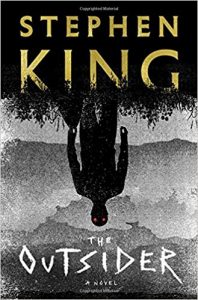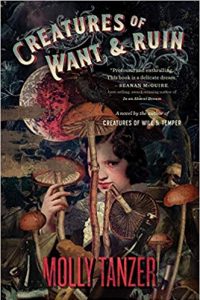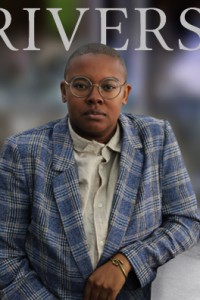2018: Comfort Reading in an Uncomfortable Year, by Tim Pratt

My reading was weird and scattered this year even by my usual weird-and-scattered standards, and the Goodreads shelf I’ve labeled “comfort re-reads” has a lot more entries than usual, as I retreated from the various unpleasant aspects of this year’s reality into old, beloved fictional worlds. I wasn’t sure I’d read enough new SF, fantasy, and horror to even justify a year-end round-up this time, but going over my list reminded me of some strong and enthusiastic feelings I want to share. It was a long hard year, after all, so let’s celebrate the good parts.
I frequently re-read selections from the oeuvre of Stephen King, because even when his books are flawed they’re compulsively readable, and even when they’re about horrible monsters, they’re ultimately hopeful about humanity. This year saw two new King titles, one big and one small, and I devoured both as quickly as always. The Outsider is full of horrific murders by a memorable monster that feeds not just on death but on destroying the lives and reputations of the victims it leaves alive. The novel is okay for the first half, but it really catches on partway through with the appearance of Holly Gibney, the socially awkward and seriously bright detective who stole so many scenes in King’s Bill Hodges trilogy. I could quibble about the pacing, but I love Holly, so I loved The Outsider.
 King’s novella Elevation is more lightweight, but charming. Affable Castle Rock resident Scott Carey starts to lose weight rapidly, but this isn’t a retread of Thinner: he’s not getting any smaller physically; he’s just getting inexplicably lighter, and gravity doesn’t behave properly in his presence. Carey’s evolving relationships with a feuding neighbor is the heart of the book, and it’s ultimately moving and even heartwarming.
King’s novella Elevation is more lightweight, but charming. Affable Castle Rock resident Scott Carey starts to lose weight rapidly, but this isn’t a retread of Thinner: he’s not getting any smaller physically; he’s just getting inexplicably lighter, and gravity doesn’t behave properly in his presence. Carey’s evolving relationships with a feuding neighbor is the heart of the book, and it’s ultimately moving and even heartwarming.
My favorite fantasy of the year was Molly Tanzer’s dark and ferocious Creatures of Want and Ruin. It’s a sequel to Creatures of Will and Temper, but the only thing it shares with book one is the supernatural premise: there are extradimensional entities, called demons, that can be enticed to make bargains with humans and grant them powers. While the first volume was set in an Oscar Wilde-inspired London, this one is set in Prohibition-Era Long Island, and is full of bootleggers, artists, the idle rich, and virulent racists with supernatural powers. Tanzer’s writing is smart and unflinching, and lots of racists get punched, which I needed to read this year.
 I’m usually a fantasy guy, but many of my favorite books this year were SF. The favorite of the favorites is the Murderbot Diaries by Martha Wells. The first novella, All Systems Red, made a splash last year, and this year we got three more: Artificial Condition, Rogue Protocol, and Exit Strategy. Murderbot is one of my all-time favorite characters, spiky and cranky and exasperated and utterly delightful to spend time with, even though it’d really rather be left alone. Artificial Condition is my favorite – I love Murderbot’s frenemy ART (Asshole Research Transport) – but you should just read them all.
I’m usually a fantasy guy, but many of my favorite books this year were SF. The favorite of the favorites is the Murderbot Diaries by Martha Wells. The first novella, All Systems Red, made a splash last year, and this year we got three more: Artificial Condition, Rogue Protocol, and Exit Strategy. Murderbot is one of my all-time favorite characters, spiky and cranky and exasperated and utterly delightful to spend time with, even though it’d really rather be left alone. Artificial Condition is my favorite – I love Murderbot’s frenemy ART (Asshole Research Transport) – but you should just read them all.
Sam J. Miller’s Blackfish City was a real treat, set in a floating arctic city sometime after the “Climate Wars” messed up global civilization. It’s a multiple-viewpoint collage of a novel, with characters including rich young people, gangsters, hustlers, and politicians, all converging around the arrival of a mysterious “orcamancer” who arrives in the company of a killer whale and a polar bear. The revelation of her purpose in the city, and the uncovering of the world’s backstory, is fascinating and satisfying.
Only Human by Sylvain Neuvel is the third and last in the Themis Files series, and it further complicates already complicated matters wonderfully. The series is about giant humanoid mech suits left on Earth by ancient aliens, and how humans try to use them for exploration and war, and how the aliens respond (the body count is off the charts), but the big shiny ideas are only half the appeal. The series is composed entirely of interviews, diaries, transcripts, letters, and other “files” that provide a wonderfully varied palimpsest of viewpoints. It’s one of the most enjoyable series I’ve read in recent years.
David H. Reiss self-published a novel called Fid’s Crusade, and though I don’t love the title I adore the book. It’s about a supervillain, a genius scientist and engineer on a personal secret crusade that brings him into conflict with cops, superheroes, world governments, and other villains. The novel is told from Fid’s point of view, and it’s simply a delight – smart, funny, engaging, and with satisfying plot twists that even surprised a jaded reader like me. Superheroes can be tough to do well in prose, and he nailed it. This deserves to stand alongside Soon I Will Be Invincible by Austin Grossman and Carrie Vaughn’s After the Golden Age.
I reviewed The People’s Republic of Everything by Nick Mamatas last month, so I won’t go on at length about it here, but it’s a wonderful collection, an unclassifiable assemblage of SF, fantasy, horror, crime, and experimental fiction, all with his signature gimlet eye for human failings and his revolutionary’s belief that we could make a better world if we weren’t all such selfish jerks and short-sighted idiots.
I was late to Nnedi Okorafor’s Binti series, but having caught up this year, I see what all the fuss was about – it’s a spare, carefully composed, fascinating science fictional world rooted in real cultures that are otherwise unrepresented in SF. This year’s concluding volume The Night Masquerade is especially harrowing and makes for a satisfying finish.
I’ll close with something I didn’t actually read this year: The Books of Earthsea by Ursula K. Le Guin. I didn’t need to read it; it collects her Earthsea series, which I read long ago. Instead, I looked at it, captivated by the scores of lavish original illustrations by Charles Vess, and delighted by its beauty as a physical object. I do most of my reading in the form of ebooks on my phone these days (my house has too many books in it already), but this one I brought home, and if you love beauty, you should, too.
In addition to being a senior editor and occasional book reviewer at Locus, Tim Pratt is the author of over 20 novels, most recently space opera The Wrong Stars, first in the Axiom series. His short stories have appeared in The Best American Short Stories, The Year’s Best Fantasy, The Mammoth Book of Best New Horror, and other nice places. He’s a Hugo Award winner for short fiction, and has been a finalist for World Fantasy, Sturgeon, Stoker, Mythopoeic, and Nebula Awards, among others. He lives in Berkeley CA with his family. Every month he writes a new story for his Patreon supporters at www.patreon.com/timpratt
This and more like it in the February 2019 issue of Locus.
 While you are here, please take a moment to support Locus with a one-time or recurring donation. We rely on reader donations to keep the magazine and site going, and would like to keep the site paywall free, but WE NEED YOUR FINANCIAL SUPPORT to continue quality coverage of the science fiction and fantasy field.
While you are here, please take a moment to support Locus with a one-time or recurring donation. We rely on reader donations to keep the magazine and site going, and would like to keep the site paywall free, but WE NEED YOUR FINANCIAL SUPPORT to continue quality coverage of the science fiction and fantasy field.







